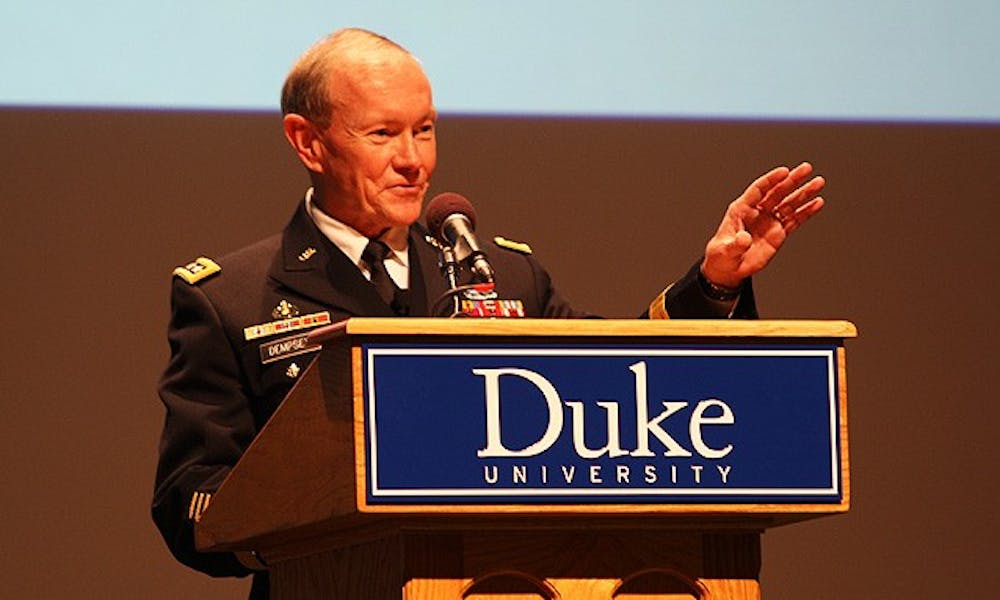The highest ranking military officer in the United States spoke Thursday about a revised military strategy in light of recent cuts in the military budget.
Gen. Martin Dempsey, the chairman of the U.S. Joint Chiefs of Staff, discussed a new strategic vision that aims to generate a leaner but nonetheless effective military in the face of growing fiscal concerns and resource scarcity. Dempsey, who earned a master’s degree in English from Duke in 1984, spoke in Page Auditorium as part of the Ambassador S. Davis Phillips Family International Lecture series.
“It makes no sense for us as a nation to have an extraordinarily capable military power if we are economically disadvantaged around the world,” Dempsey said. “We are only as strong as the three pillars—diplomatic, information and economic—[which] interrelate with each other to achieve a common outcome. If one of those pillars is weakened, they’re all weakened.”
Dempsey defined grand strategy as the integration of the instruments of national power to achieve particular outcomes. The new strategy, which President Barack Obama announced earlier this month, decreases the size of the military and focuses its power more on Asia and less on the Middle East for the remainder of this decade. Dempsey, however, rejected the idea that the military was a victim of the cuts.
“We the military are not being victimized by this budget issue,” he said. “We clearly have a role to play, all of us as citizens, in helping the nation address its economic crisis.”
Dempsey added that he could not recollect a time previously in his military experience in which cost was a major factor in developing military strategy—at least not until now.
“We understand that for the nation to overcome its debt crisis and some of its other economic challenges, we’ve got to get a hold of cost as an independent variable,” he said. “Strategy is about context and choice—choices have consequences, and consequences produce new context.”
Dempsey spoke with good humor and several times recalled his student days at Duke, including a nod to a favorite bar stool at Shooters II. He also credited his English studies with building his confidence, pushing him to seek new ideas and improving his ability to communicate persuasively. When Dempsey arrived at Duke in 1982, men’s basketball coach Mike Krzyzewski was unpopular on campus, Dempsey said, connecting this anecdote to the broader point that good strategies may take time to succeed.
“We know there’s going to be mistakes—we know there will be missteps,” he said. “Ultimately, we continue to grow and develop mostly through adversity.”
In a live online office hours session earlier Thursday, Peter Feaver, professor of political science and director of Duke’s Program in American Grand Strategy, noted that developing a new strategy is often accompanied by risk.
“What I think is most interesting is what President Obama did not say and that is that there are serious risks involved with this new strategy,” Feaver said. “You can’t reduce the money going to defense without incurring some risks.”
Feaver, a former member of the White House’s National Security Council, added that the current administration views the growing deficit as a national security problem.
“One of the things that’s clear from the Obama announcement is that the administration views our fiscal situation as itself a threat to our national security,” he said. “The large deficits that the U.S. budget is running and the large amount of debt that we’re accumulating will at some point affect the American power.”
Srinivas Katikithala, a master’s of international development policy degree program fellow at the Sanford School of Public Policy, commended the military’s efforts to function with less funding.
“It is always very simple and easy to say that we don’t have enough, but to say that we have this and we will do the best with it is a very fresh way of looking at it,” Katikithala said.
Get The Chronicle straight to your inbox
Signup for our weekly newsletter. Cancel at any time.

